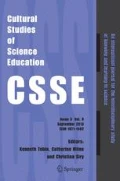Abstract
This paper is written in response to Angela Chapman and Allan Feldman’s research study, “Cultivation of science identity through authentic science in an urban high school”. I utilize this forum piece to extend the call for “awakening a dialogue” that critically assesses the effectiveness of current K-12 science education research in addressing the needs of populations of color. I take the opportunity to first discuss elements of what an equitable research focus might look like. I finish by critiquing and ultimately commending the authors on the degree to which they succeed in demonstrating an equitable approach to the design and carrying out of their study.
Similar content being viewed by others
References
Alexander, M. (2010). The new Jim Crow: Mass incarceration in the age of colorblindness. New York: New Press.
Bourdieu, P., & Wacquant, L. (1992). An invitation to reflexive sociology. Chicago: The University of Chicago Press. doi:10.2307/2074573.
Carlone, H., & Johnson, A. (2007). Understanding the science experiences of successful women of color: Science identity as an analytic lens. Journal of Research in Science Teaching, 44, 1187–1218. doi:10.1002/tea.20237.
Census, race and science [Editorial]. (2000, February). Nature Genetics, 24, 97–98. doi:10.1038/72884.
Chapman, A., & Feldman, A. (2016). Cultivation of science identity through authentic science in an urban high school classroom. Cultural Studies of Science Education. doi:10.1007/s11422-015-9723-3.
Colby, S. L., & Ortman, J. M. (2014). Projections of the size and composition of the US population: 2014–2060, Current Population Reports, P25-1143. Washington, DC: U.S. Census Bureau.
Emirbayer, M., & Desmond, M. (2012). Race and Reflexivity. Ethnic and Racial Studies, 35, 574–599. doi:10.1080/01419870.2011.606910.
Gentles, S. J., Jack, S. M., Nicholas, D. B., & McKibbon, K. A. (2014). A critical approach to reflexivity in grounded theory. The Qualitative Report, 19, 1–14.
Graham, L., Brown-Jeffy, S., Aronson, R., & Stephens, C. (2011). Critical race theory as theoretical framework and analysis tool for population health research. Critical Public Health, 21, 81–93. doi:10.1080/09581596.2010.493173.
Guerra, A., & Rezende, F. (2016). Sociocultural influences on science and on science identities. Cultural Studies of Science Education. doi:10.1007/s11422-016-9771-3.
Ladson-Billings, G. (1995). Toward a theory of culturally relevant pedagogy. American Educational Research Journal, 32(3), 465–491. doi:10.3102/00028312032003465.
Maton, K. (2003). Reflexivity, relationism, & research: Pierre Bourdieu and the epistemic conditions of social scientific knowledge. Space and Culture, 6, 52–65.
Newton, B. J., Rothlingova, Z., Gutteridge, R., LeMarchand, K., & Raphael, J. H. (2011). No room for reflexivity? Critical reflections following a systematic review of qualitative research. Journal of Health Psychology, 17, 866–885. doi:10.1177/1359105311427615.
Walls, L. (2012). Third grade African American students’ views of the nature of science. Journal of Research in Science Teaching, 49, 1–37. doi:10.1002/tea.20450.
Walls, L. (2015). Awakening a dialogue: A critical race theory analysis of US nature of science research from 1967 to 2013. Journal of Research in Science Teaching, (online version June 2015). http://dx.doi.org/10.1002/tea.21266.
Yudell, M., Roberts, D., DeSalle, R., & Tishkoff, S. (2016). Taking race out of human genetics. Science, 351, 564–565. doi:10.1126/science.aac4951.
Author information
Authors and Affiliations
Corresponding author
Additional information
Lead Editor: F. Rezende.
This forum paper is a response to Angela Chapman and Allan Feldman’s article Cultivation of science identity through authentic science in an urban high school. doi:10.1007/s11422-015-9723-3.
Rights and permissions
About this article
Cite this article
Walls, L. Equitable research: a bridge too far?. Cult Stud of Sci Educ 12, 493–503 (2017). https://doi.org/10.1007/s11422-016-9770-4
Received:
Accepted:
Published:
Issue Date:
DOI: https://doi.org/10.1007/s11422-016-9770-4




